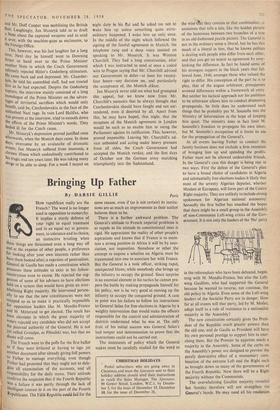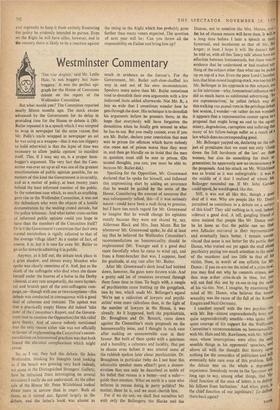Bringing Up Father
How republican really are the French? The word is no longer used in opposition to monarchy. It implies a sturdy defence of your right to equal treatment and to an equal say in govern- ment, to tolerance and to choice, an instinctive bristling when these things are threatened even a long way off and at the expense of other people, a preference for looking after your own interests rather than have them looked after, a rejection of paternalism. General de Gaulle has made a constitution which presumes these attitudes to exist in his fellow- countrymen even to excess. He rejected the sug- gestion of some of his advisers to have elections held on a system that would have given an over- whelming Right majority. He intervened person- ally to see that the new constituencies were not Mapped so as to make it practically impossible for opposition leaders like M. Mendes-France and M. Mitterand to get elected. The result has been elections in which the great majority of voters rejected any candidate who did not accept the paternal authority of the General. He is not Yet called Grandpa, as Pilsudski was, but that no doubt will come.
The French went to the polls for the first ballot as if they were irritated at having to sign yet another document after already giving full powers to Father to manage everything, even though Father had protested that they ought not to dele- gate all examination of the accounts, and all responsibility for the daily menu. Their attitude Confirms the suspicion that if the Fourth Republic was a failure it was partly through the lack of intelligent interest in it on the part of the Fourth Republicans. The Fifth Republic could fail for the same reason, even if (as is not certain) its institu- tions are as much an improvement as their author believes them to be.
There is a further awkward problem. The General's attitude to French imperial problems is as supple as his attitude to constitutional ones is rigid. He appreciates the reality of other people's aspirations and knows that if France is to main- tain a strong position in Africa it will be by asso- ciation, not imposition. Somehow or other the attempt to impose a solution on Algeria must be transmuted into one to associate her with France. But the General is a tank officer, striking rapid, unexpected blows, while somebody else brings up the infantry to occupy the ground. Since surprise is an essential element in his tactics he cannot pre- pare the battle by making propaganda himself for his policy, nor is he very good at moving up the infantry to occupy the conquered ground. A case in point was his failure to follow his instructions to General,Salan for free elections in Algeria by a weighty intervention that would make the officers responsible for the control and administration of districts understand what he was at. The only fruit of his initial success was General Salan's bad temper and determination to prove that the instructions could not be carried out.
The statements of policy which the General makes must be carefully studied for the word to the wise ttat they contain or that combination ut omissions that tells a tale, like the hidden picture of the huntsman between two branches of a tree in an old-fashioned puzzle picture. The General is not in the ordinary sense a liberal, but he has this much of a liberal in him, that he knows politics is dealing with people who differ from each other, and that you get no nearer to agreement by over- looking the difference. In fact he found some of his strongest support in the black years that fol- lowed June, 1940, amongst those who valued the right to differ. His conception of the part he is to play, that of the august arbitrator, presupposes avowed differences within a framework of unity. But neither his tactical approach nor his ambition to be arbitrator allows him to conduct drumming propaganda. So little does he understand such things that he probably put M. Soustelle into the Ministry of Information in the hope of keeping him quiet. The ministry does in fact limit M. Soustelle's freedom to propagate his own ideas; but M. Soustelle's occupation of it limits its use for the propagation of the General's.
At all events leaving Father to conduct the family business does not exclude a firm intention of bringing him up and spending the profits. Father must not be allowed undesirable friends. In the General's case this danger is being met in two ways. First the defeat of the General's plan to have a broad choice of candidates in Algeria and substantially free elections makes it likely that most of the seventy Algerian deputies, whether Moslem or European, will form part of the Centre Right majority. They are unlikely to include strong spokesmen for Algerian national autonomy.
Secondly the first ballot has smashed the hopes that there might be a small group in the Assembly of non-Communist Left-wing critics of the Gov- ernment. It is not only the leaders of the 'No' party in the referendum who have been defeated, begin- ning with M. Mendes-France, but also the Left- wing Gaullists, who had supported the General because he wanted to reverse, not continue, the old policy in Algeria. Even some of the Left-wing leaders of the Socialist Party are in danger. How far at all events will that party, led by M. Mollet, adapt itself to a role of resistance to a nationalist majority in the Assembly?
The new constitution certainly gives the Presi- dent of the Republic much greater powers than the old one, and de Gaulle as President will have his own personal prestige to support him in exer- cising them. But the Premier he appoints needs a majority in the Assembly. Some of the curbs on the Assembly's power are designed to prevent the purely destructive effect of a momentary com- bination of the extreme Left and the Right such as brought down so many of the governments of the Fourth Republic. Now there will be a Right majority without the Communists.
The overwhelming Gaullist majority revealed last Sunday therefore will not strengthen the General's hands. He may need all his resolution and ingenuity to keep it from entirely frustrating the policy he evidently intended to pursue. Even on the Right he will have allies, however, and in the country there is likely to be a reaction against the swing to the Right which has probably gone farther than many voters expected. The question of next year will be: Can you throw all the responsibility on Father and bring him up?































































 Previous page
Previous page